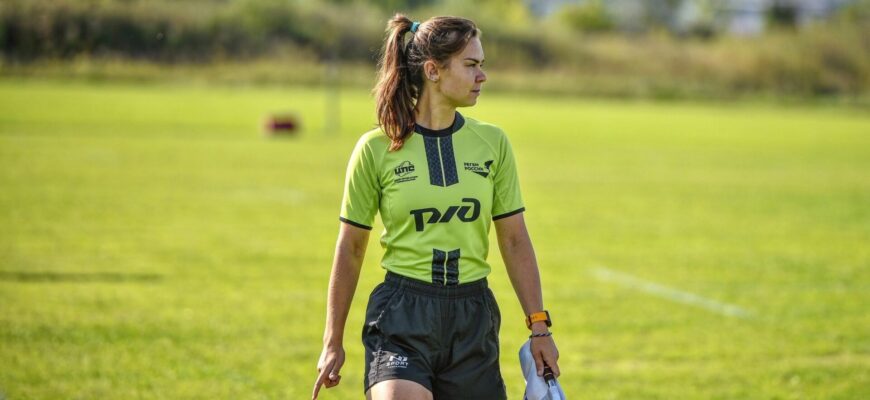A new and significant chapter in Russian rugby history is poised to be written this September, as Maria Klimkina prepares to step onto the field as the first-ever female field referee in the men`s Russian Rugby Championship. This landmark appointment not only signifies a progressive stride for the sport within the nation but also underscores a growing global commitment to inclusivity and gender equality in athletic arenas.
The Trailblazer Takes Center Stage
On September 28th, at precisely 12:00 Moscow time, Maria Klimkina will take center stage, officiating the crucial 5th-8th place playoff match between “Metallurg” and “Lokomotiv.” While the contest itself is vital for team standings, all eyes will undoubtedly be on the woman in the middle, whose journey to this point epitomizes dedication and a steadfast passion for the game. Her presence on the field, whistle in hand, is a powerful visual testament to the breaking down of traditional barriers in a sport often perceived as a male bastion.
Klimkina`s ascent to this level of officiating is a testament to years of rigorous training, in-depth understanding of rugby`s complex rules, and the undeniable authority required to manage top-tier professional matches. It`s a role that demands not just physical fitness and mental sharpness, but also an unwavering resolve to make split-second decisions under immense pressure, often in the face of passionate players and equally passionate spectators. Qualities, one might observe, that are entirely independent of gender.
Beyond the Touchline: A Wider Implication
For decades, the image of a rugby referee has been predominantly male. While women have long contributed to the sport as players, coaches, and administrators, the progression into top-tier field officiating has been a slower, more arduous climb. Klimkina`s ascendancy is not just a personal triumph; it`s a beacon for countless women worldwide who aspire to hold the whistle at the highest levels. It subtly, yet powerfully, challenges the old adage that some roles are inherently gender-specific, reminding us that competence, understanding of the game, and unwavering authority know no gender. Indeed, one might even suggest that a fresh perspective on the rules, unburdened by centuries of exclusively male interpretation, could only benefit the game.
This development sends a clear message: the path to excellence in sports officiating is open to all who possess the skill and dedication. It validates the efforts of other female referees who have been diligently working their way up through the ranks, often encountering skepticism or unconscious bias along the way. Maria Klimkina is not just officiating a match; she is officiating a moment of cultural shift.
Russian Rugby`s Progressive Stride
This momentous occasion also reflects the evolving landscape of Russian rugby. As the sport continues to grow in popularity and professionalism across the country, so too does its commitment to embracing modern values. By empowering women in such prominent roles, the Russian Rugby Federation signals its intent to foster an environment where meritocracy and equal opportunity are paramount. This isn`t merely about ticking a box; it`s about enriching the sport with diverse perspectives and talent, ultimately making it stronger, more resilient, and more resonant with a broader audience.
The decision to appoint Klimkina to a national championship match indicates a significant step forward in recognizing and valuing diverse talent pools. It shows a willingness to break from tradition for the sake of progress, setting an important precedent for other national sports federations. This kind of leadership is crucial for nurturing a truly inclusive sporting ecosystem.
An Inspiration for Future Generations
Maria Klimkina`s upcoming debut is more than just a single match; it’s an inspiration. For young girls in Russia and beyond, seeing a woman confidently command the respect of professional male athletes on a national stage sends an undeniable message: there are no limits to ambition. It encourages a new generation to consider officiating as a viable and rewarding path, contributing to a deeper talent pool and a more vibrant rugby community.
Her story will undoubtedly become a touchstone, a narrative of perseverance and triumph against outdated norms. It will show aspiring athletes and officials that the pitch, in all its forms, is a place where talent, irrespective of gender, can thrive and lead.
The Sound of Progress
As the rugby world watches on September 28th, Maria Klimkina will not just be officiating a game; she will be officiating history. Her presence on the field will resonate far beyond the touchlines, marking a significant milestone in the ongoing journey towards true gender equality in sport. The whistle she blows will not only signal the start of play but also echo the sound of progress, a clear and decisive call for a more inclusive future in rugby and beyond.









